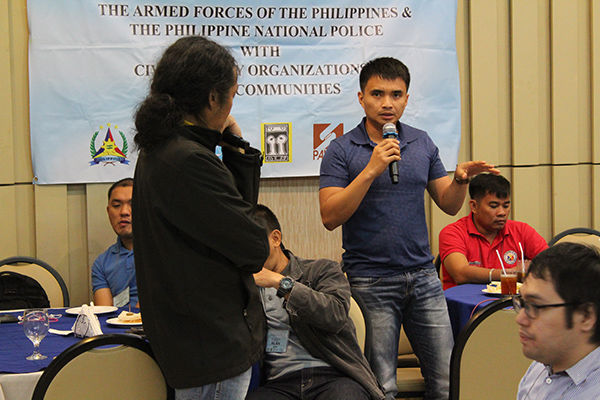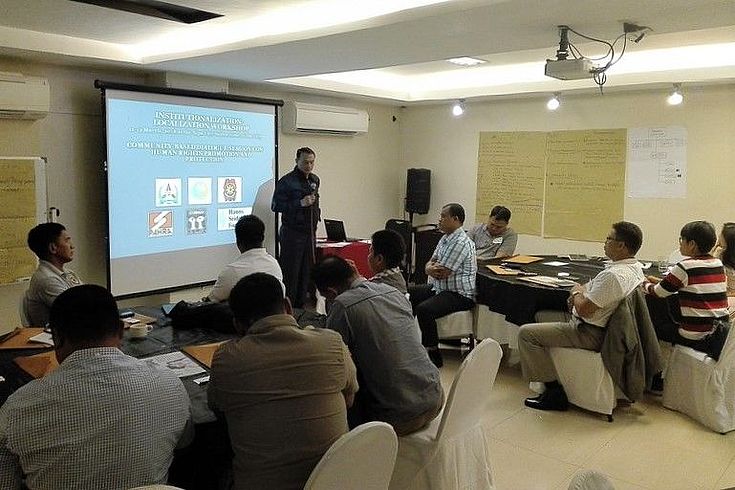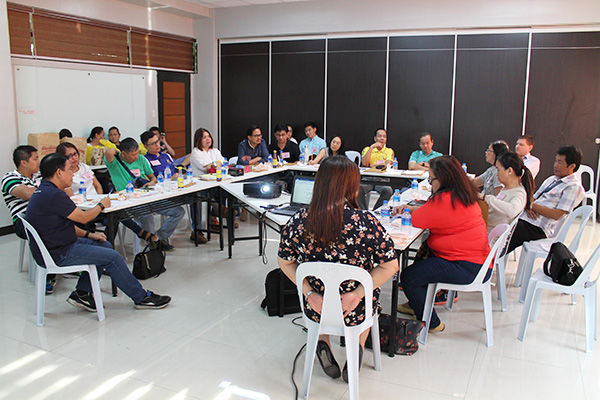Community-based Dialogue Sessions on Human Rights Promotion and Protection
The “Community-based Dialogue Sessions on Human Rights Promotion and Protection between the Armed Forces of the Philippines and the Philippine National Police, and Civil Society Organizations and Local Communities” is a project cooperation among the Armed Forces of the Philippines Center for Law of Armed Conflict (AFP CLOAC, formerly Human Rights Office) and Offices of the Deputy Chief of Staff for Civil Military Operations (AFP J7), and for Education and Training (J8); the Philippine National Police Human Rights Affairs Office (PNP HRAO) and Directorate for Human Resource and Doctrine Development-Training Service/Regional Specialized Training Units (DHRDD-TS/RSTUs), the Commission on Human Rights (CHR), the Philippine Alliance of Human Rights Advocates (PAHRA), the Alternative Law Groups (ALG) and the Hanns Seidel Foundation (HSF) of Germany.
The overall objective of the project is to contribute to the improvement of the human rights situation in the Philippines primarily through the enhancement of the relationship between the AFP and PNP, on one hand, and local communities and civil society organizations, on the other hand, in the common effort to promote human rights. The specific objective of the project is to help create venues for the security sector (AFP and PNP) through their respective human rights offices and training units, civil society organizations (CSOs) and local government institutions, to collectively discuss the issue of human rights promotion and protection, and how cooperative efforts for on-going and future actions toward this end can be maximized.
The project has completed five (5) phases and is now on the first year (2023) of its sixth phase. The project was launched in 2008, at a time when the Philippines got the attention of the international community as a result of the alarming rise in unresolved cases of extrajudicial killings and enforced disappearances.
After 14 years of implementation, the project shall continue its framework and essential components, but with a renewed strategic direction that is envisioned to sustain its gains and achieve the goal of institutionalizing the project (especially at the local level). There is a need for the project to adapt to the changing landscape, while continuing to address the persistent issues and challenges. With the very fruitful experience of the past years, and with the benefit of lessons learned from previous engagements and activities, the project shall hold on to its gains and take a strategic direction that is compelled by the current situation.

HSF
Strengthening Partnerships, Deepening Dialogues
A major achievement of the project is the partnership that it has cultivated not only among the project partners, but among the different stakeholders, especially in local areas. Indeed, the level of engagement among the security forces, the CHR and the CSOs, and local government units/bodies, has been very dynamic. The project shall harness this partnership that has been built through years of dialogue and cooperation. It is this partnership that sets the project apart from other similar human rights initiatives. This continuing partnership, in itself, becomes a platform for many collaborative efforts among the stakeholders, both within the project, and through related initiatives.
The project partners still see the value of working within the framework of dialogues. This entails the constructive discussion of human rights issues, policy gaps and policy reforms, aimed at the effective resolution of issues. Over the years, the dialogues have progressed from its initial focus on civil and political rights (CPR) to an expanded coverage on economic, social and cultural rights (ESCR). Multi-sectoral Human Rights Training Handbooks on CPR and ESCR were published to serve as standard training material for trainers, facilitators and educators who attended the CBD training sessions.
The next phase will still utilize community-based dialogues (CBD) alongside top- and regional-level policy forums as its main mechanism but will complement this with regional core group strengthening activities, which will be venues for the formulation of concrete policy actions, monitoring and resolution of issues/cases on the ground, and capacity-building of core group members at the local level.

ALG, HSF
Institutionalizing Local Cooperation and Action
Consistent with the objective of institutionalizing the gains of the project, efforts to strengthen the CBD regional core groups shall continue. The objective will be to institutionalize the CBD mechanism at the local level (which can serve as early warning system for prevention of HRVs, quick reaction teams, monitoring/resolution of cases, training, etc.). The CHR Regional Office serves as convenor and CSOs as co-convenor of the core group, with the designated human rights and/or training officers of the AFP and PNP in the local areas, local government institutions, and other stakeholders as members.
With the issuance in 2015 of the CHR resolution mandating the CHR Regional Offices to convene Community-Based Dialogues (CBD), to co-organize multi-sectoral human rights education and training activities, and to coordinate regional-level policy dialogues, CHR Regional Offices are expected to play a more active role, and more robust localization and institutionalization of the dialogues are foreseeable. What the project needs to do is to ensure that the members of the local core groups have the necessary capacity to do their expected tasks. Towards achieving the goal of institutionalizing the CBD mechanism at the local level, closer cooperation shall be pursued with the Regional Peace and Order Councils (RPOCs) and Regional Development Councils (RDCs) as well as relevant government agencies.

HSF
The project shall provide necessary support for strengthening the local CBD mechanism and this will be done by convening core group strengthening workshops in focus regions. The workshops will include scanning of social justice and human rights issues in each area, as well as formulation of an appropriate coordination, reporting, monitoring and evaluation system which will guide the project implementation for the new phase.
During the workshops, the different regional core groups are expected to discuss and finalize their respective work-plans on how they can utilize the multi-sectoral network to address human rights issues and continue to promote human rights in their respective areas.
With improved relationships between the security forces and civilian communities, and with local cooperative mechanisms in place, the dialogues are expected to deepen, and result in actual resolution of issues, insofar as the roles of the police and military personnel are concerned.
